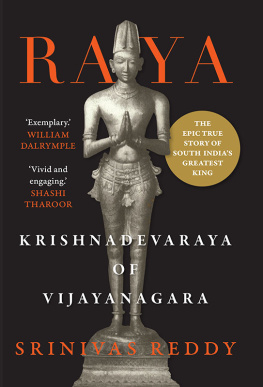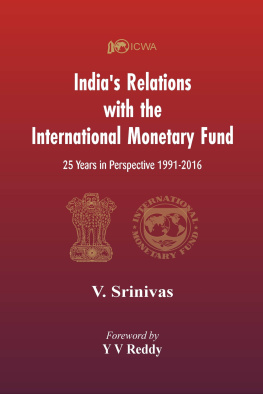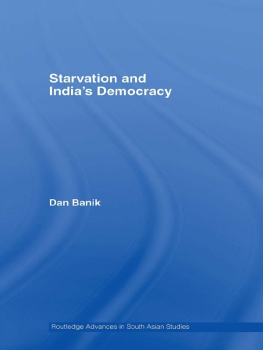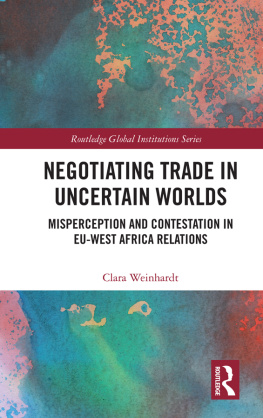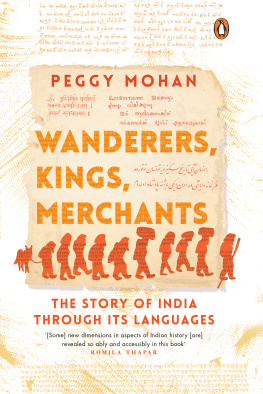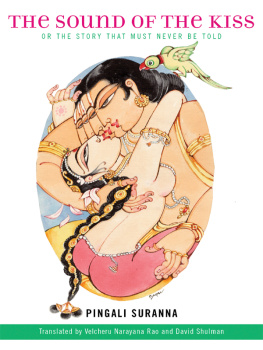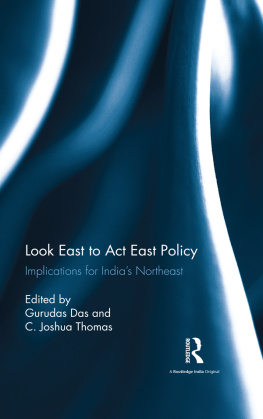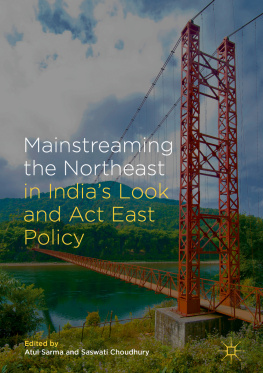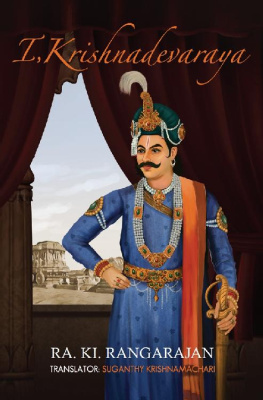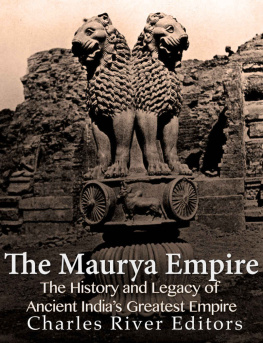Table of Contents

Raya
Raya
Krishnadevaraya of Vijayanagara
Srinivas Reddy

Praise for the Book
An exemplary biography that brings the whole world of Vijayanagara to life as no previous book has ever before succeeded in doing. Minutely researched, full of new material with apparently effortless command over primary sources in multiple languages, this finely written study of the great king Krishnadevaraya is full of good stories, revealing anecdotes and cleverly analysed myths. It makes an excellent introduction to the history of Vijayanagara and should be required reading for all visitors to Hampi. William Dalrymple
Though reigning for a mere twenty years at the start of the sixteenth century, Krishnadevaraya became synonymous with the aura of the Vijayanagara empire, with Tirupati (the worlds richest temple today) and with the Telugu language. But as a man Raya has remained almost completely elusive until this riveting study. Rajmohan Gandhi
Srinivas Reddys Raya offers a vivid and engaging account of the life and brilliance of the mighty Krishnadevaraya and chronicles with great clarity the charisma, force and vision with which he would establish the powerful Vijayanagara empire a glorious period of our history whose rich legacy lives on to this day. Shashi Tharoor
In this unique biography of Krishnadevaraya, Srinivas Reddy captures the interests both of the general reader and of the specialist historian. He uses an impressive array of primary sources, liberally quoting from them to preserve their distinct textures and flavours. Periodically the narrative opens up to discuss broader issues of overarching importance, such as the nature of courtly culture and debates in the historiography of Vijayanagara. His argument that Krishnadevarayas real nemesis was not any of the Muslim sultans of the northern Deccan, but rather the Hindu Gajapati ruler Prataparudra is compelling and original. That Reddy manages to harmonize all this is a testament to the unifying quality of his engaging narrative. The book is a must-read for anyone interested in Indian history. Phillip B. Wagoner
JUGGERNAUT BOOKS
KS House, 118 Shahpur Jat, New Delhi 110049, India
First published by Juggernaut Books 2020
Copyright Srinivas Reddy 2020
10 9 8 7 6 5 4 3 2 1
The views and opinions expressed in this book are the authors own. The facts contained herein were reported to be true as on the date of publication by the author to the publishers of the book, and the publishers are not in any way liable for their accuracy or veracity.
P-ISBN: 9789353450977
E-ISBN: 9789353450984
All rights reserved. No part of this publication may be reproduced,
transmitted, or stored in a retrieval system in any form or by any means without the written permission of the publisher.
For sale in the Indian Subcontinent only
Typeset in Adobe Caslon Pro by R. Ajith Kumar, Noida
Printed at Thomson Press India Ltd
for
Professor Padmanabh S. Jaini
quidquid agunt homines, votum, timor, ira, voluptas
gaudia, discursus, nostri farrago libelli est.
Whatever things occupy people their desires and fears, their angers and pleasures, their joys and runnings about
they become the medley of our little book.
Juvenal, Satires I.I.856
vijayanagara-vttntamu
sujanalache vinnayai snta-vkyul
prajalaku teapaag
sjiyiciti krya ekharu-carital
So that the people may clearly know
the history of Vijayanagara,
I have put together the deeds of King Krishnaraya,
in true and pleasing words
that one might hear from virtuous men.
Ryavcakamu I.1
Contents
In the winter of 1515, a mighty army pitched camp along the banks of the Krishna river, deep in the heart of Telugu country. Meanwhile, their trusted leader quietly made his way to a nearby temple where locals worshipped a regional form of Lord Vishnu. It was the sacred Vaishnava day of Ekadashi, and King Krishnadevaraya of Vijayanagara fasted with devotion before laying his head to rest in the temples sacred cloisters. It was the eve of the young Tulu kings greatest battle, and that night he had a dream that would forever change his life, and the fate of his people.
The benevolent god Andhra Mahavishnu appeared before the king his lustrous black body was cloaked in golden silk, his wide open eyes were bright as lotus flowers, and the Kaustubha gem on his chest was a deeper red than the rising sun. The king was awestruck and humbled as god himself spoke to him in a gentle but serious tone: Youve already written works in Sanskrit, but now you must compose an epic poem in Telugu, the language of the people! Tell the story of Andal and my wedding in Srirangam, for though I am a Telugu king and you are the king of Kannada, Vishnu is one and the same for everyone. Do this for my glory and your future will grow brighter and brighter with each passing day! And with these prophetic words, Andhra Mahavishnu disappeared into the darkness.
Early the next morning Krishnadevaraya awoke astonished. He performed all the rituals with deep devotion and offered his salutations to the central temple spire. Next he called together all his priests and soothsayers and related his most wondrous dream. The assembly was amazed to hear of the gods visitation and assured the king that the auspicious vision meant certain victory. Lord Vishnu himself was commanding a king of Karnataka to write about a Tamil saint in classical Telugu! Krishnadevaraya thus felt perfectly capable of uniting the whole of south India under his inclusive banner. And so, with this divine mandate in his heart, the young king rallied his men together and set out to face his most hated enemy.
His arch-rival was not one of the five Bahmani sultans who continued to harass the empires northern border, but rather the Gajapati king Prataparudradeva of Kalinga. This proud king now controlled many key strongholds south of the river Krishna, and Krishnadevaraya was determined to reclaim them for Vijayanagara. The deep animosity between the two Hindu kings had been boiling for years Prataparudradeva was a blue-blooded kshatriya, born into a long line of Solar dynasty kings, and Krishnadevaraya was but a low-caste upstart from humble origins. Prataparudradeva lorded it over Krishnadevaraya; he insulted him whenever he could by calling him a dasi-putra, the son of a servant girl, and never once saw him as an equal. The piercing taunts had worked, and Krishnadevaraya now marched with unrelenting resolve to humble his haughty rival. He knew in his heart that he was a great king, Lord Vishnu believed it too, and Krishnadevaraya was determined to prove his mettle to the world.

Today, Krishnadevaraya of Vijayanagara is remembered as the iconic king of south India. Most histories portray him as a Hindu warrior who crushed Muslim invaders, some paint him as a peasant who rose to become an emperor, and yet others remember him as a shrewd statesman, a brilliant poet or a benevolent ruler. Each of these identities contributed to the kings remarkable persona, but he was much more than any one of these readings. What makes Krishnadevaraya so exciting is that his life embodies all the vibrant dynamism of his era, a time that witnessed radical transformations in the social, cultural and political life of South Asia, and the world at large. His two-decade reign from 1509 to 1529 falls in what scholars call the early modern period, a precipice of world history when new global networks were being forged cultures merged and cultures clashed, but the vast lands of the earth were not yet claimed by European colonialism. Krishnadevaraya thus represents a critical transformation from ancient king to modern politician. And in that sense, he was Indias first global leader. He had to confront very modern problems such as building international alliances and negotiating overseas trade deals while grappling with the challenges of globalism and multiculturalism. The Deccan of his time was a place where Hindus and Muslims, north Indians and south Indians, Persians and Portuguese, all intermingled as they made their lives and fortunes.

